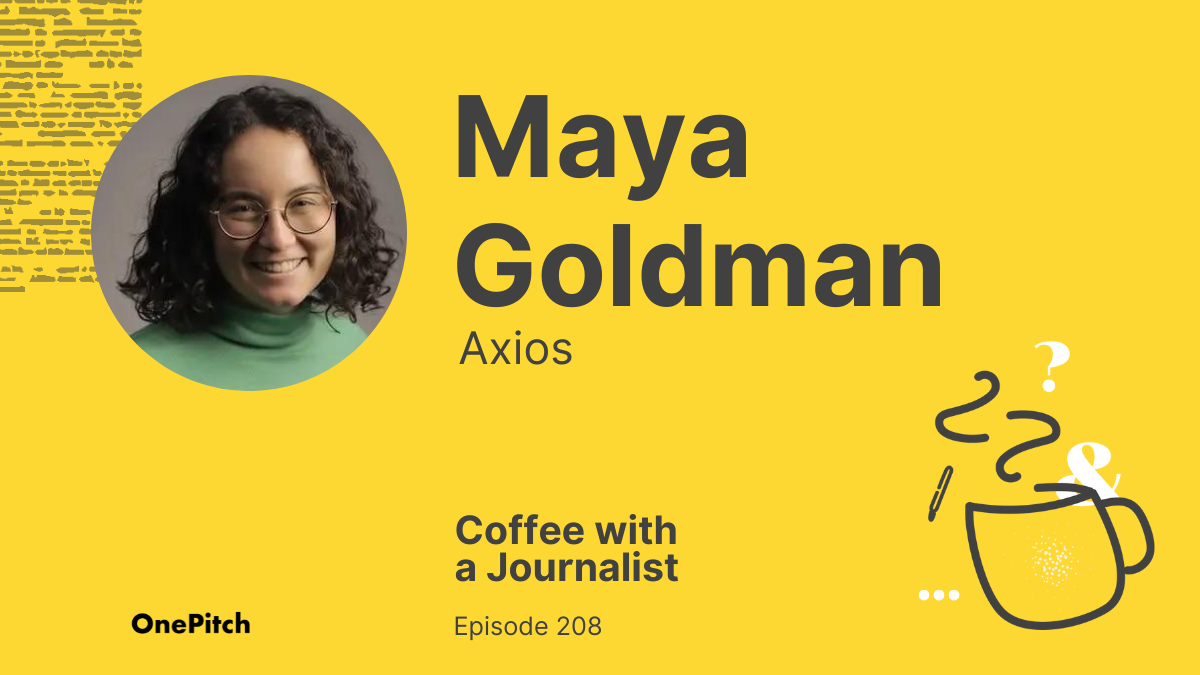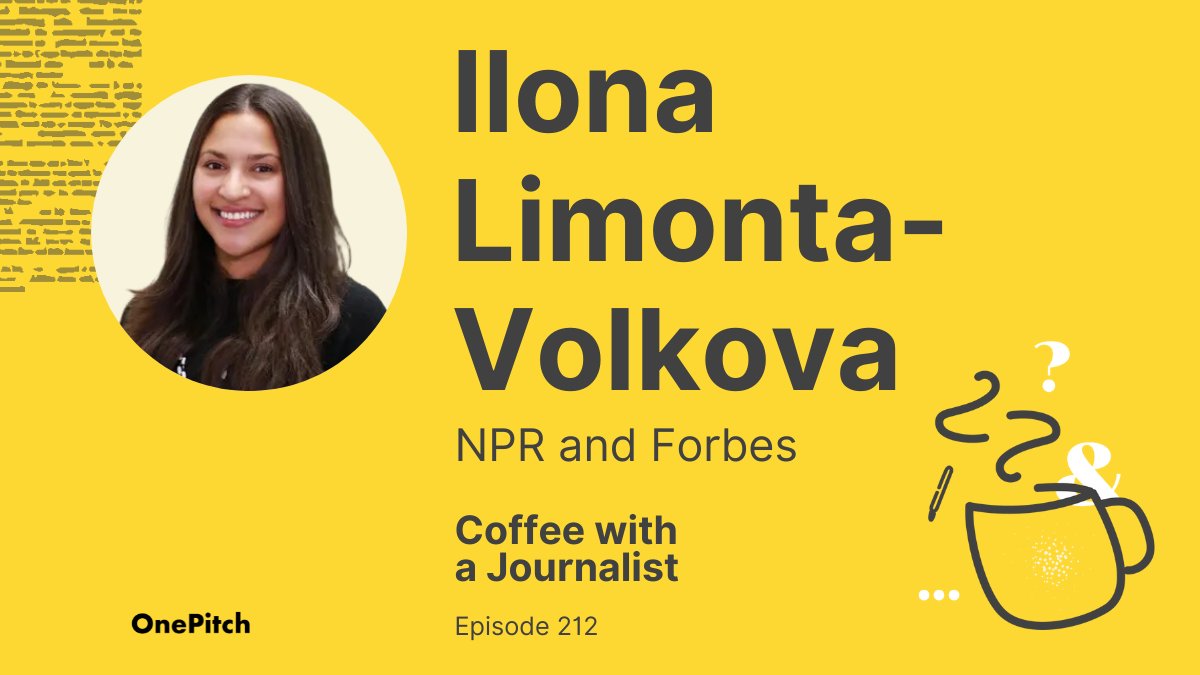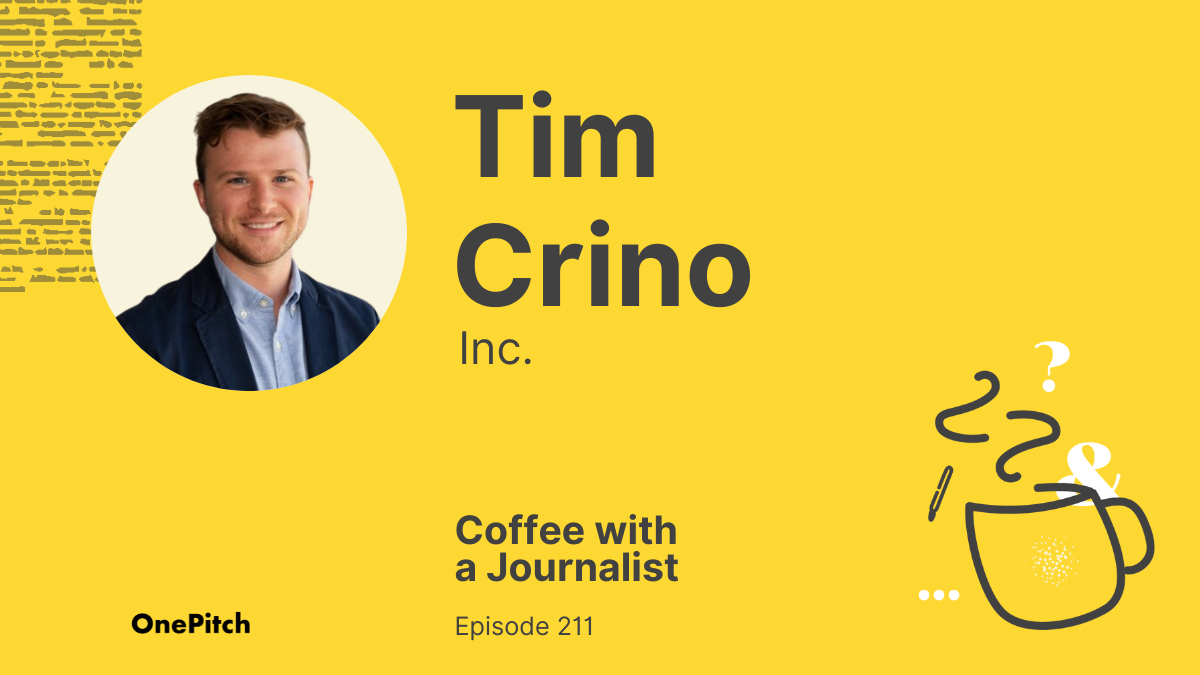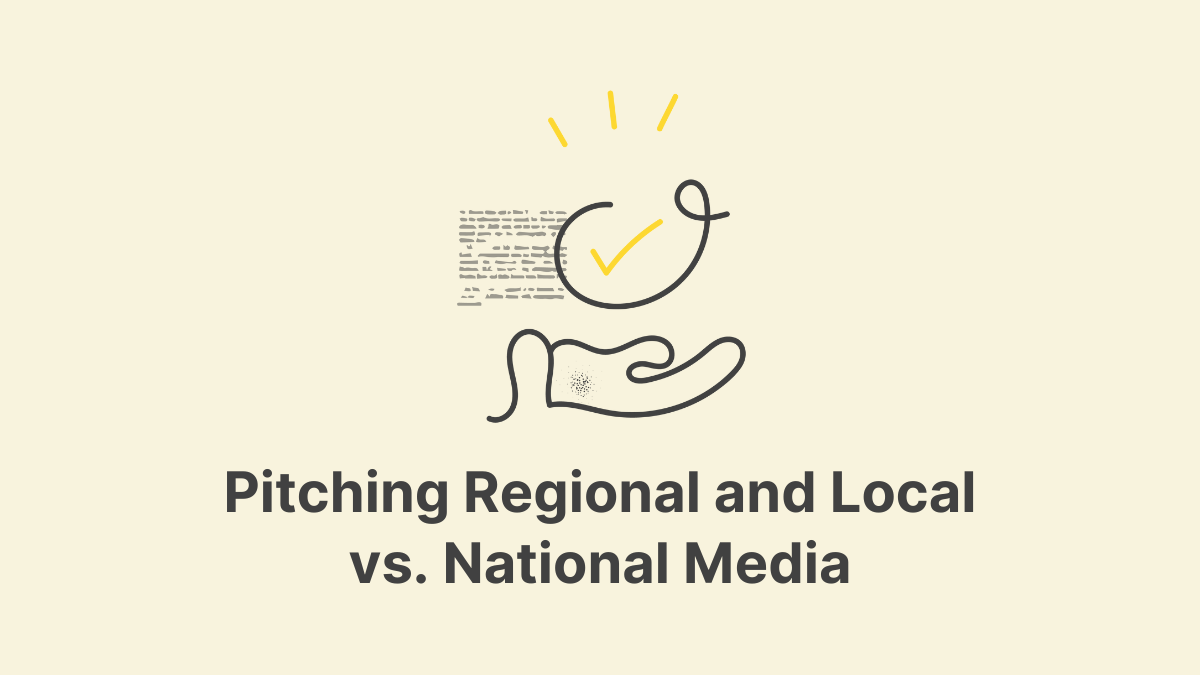Ilona Limonta-Volkova is the host of Money Memories, an NPR podcast, as well as a contributing...
×
Coffee with a Journalist: Maya Goldman, Axios
- 03/26/2024
- OnePitch
- Media Insights, Coffee with a Journalist
Maya Goldman is a reporter at Axios where she covers health care and health policy, including topics like Medicare payment, telehealth, and price transparency.
During the episode, Maya walks us through her email inbox routine and discusses her preferences on how she works with sources, effective pitch timing, and more.
Follow her on LinkedIn and Twitter.
Click below to listen to the full conversation and read below for highlights from the interview:
Maya's Beat and How She Uses Her Email Inbox
[0:00:58] BB: Maya is here with us today. Maya Goldman, she is the health policy reporter from Axios. We’re going to be talking about, well, and actually she's been there for a little while. All things health policy related. There's a lot going on in health policy right now, Maya. My goodness, you must be busy. Thank you for being here. How are you doing?
[0:01:42] MG: Thank you so much for having me, Beck. It's great to be here. Always busy. That is the joke with health care journalism is that there's more job security than in other parts of the industry.
[0:01:53] BB: Good point. There really is, because my God, from Medicare to federal agency stuff, price transparency, it never ends. As I’m looking at just some of your articles, you're talking about everything from EPA to health groups, improving care for intellectual disabilities, you're covering Biden budget stuff. We talk about microplastics quite a bit. First thing, before we get into your specific coverage, for those who maybe aren't as familiar, how would you describe the coverage of Axios?
[0:02:24] MG: Axios is built around this core tenant of what we call smart brevity. It's very to-the-point journalism that gives you what you need to know without the fluff that you can read in like a minute or two minutes. I'm really coming in with like the "why it matters" of it all. That's the basic vibe of Axios and I co-write a health care newsletter that does exactly that for health care journalism.
[0:02:52] BB: Transitioning to your inbox, how does that look?
[0:02:56] MG: It is chaotic.
[0:02:58] BB: Yeah.
[0:02:59] MG: I tend to describe it in one word. Lots of emails. I am an inbox zero kind of person.
[0:03:05] BB: Oh, I feel more people are getting on this boat with a lot of people on the last couple of shows here are down to the zero, but let's clarify that. Zero as in there's nothing in the inbox or zero unread.
[0:03:18] MG: Zero unread.
[0:03:18] BB: Okay. That's me, too.
[0:03:20] MG: Save the emails in the inbox.
[0:03:22] BB: I never trash anything practically, because I'm wait, there could be something. Okay. How often are you hitting the zero? Every day?
[0:03:29] MG: I try to go through every morning.
[0:03:31] BB: Every morning. Okay. A 24-hour cycle. You want to be down to zero.
[0:03:37] MG: I like to do that. It's obviously easier said than done, but that's my goal.
[0:03:41] BB: Of course. Okay. Further, what are you doing with the emails? Because I'm sure you're getting – well, actually, let's even back up a second. How many emails are you getting a day?
[0:03:53] MG: I usually would say I get around 200 emails a day.
[0:03:59] BB: Okay. That's a hefty-ish amount. Then how are you blazing through all of those to know where you're going and what you're doing?
[0:04:06] MG: Well, a lot of those maybe half are like delete immediately, like this is from a listserv. That's just like a one-word update or a press release from the White House that has nothing to do with my beat. A lot of them are delete immediately. I usually by now, I'm like familiar enough with my inbox to know what I can delete on sight. Then things that don't fall in those boxes, like individual pitches or my morning newsletters that I read from other journalists, I'll usually open those and skim through it, but it has to be pretty eye-catching to get me to read the whole thing.
[0:04:47] BB: Yeah.
[0:04:48] MG: A lot of those will go into either they'll get, I'll click on read or I have also a folder that is called "interesting things to follow up on," which is probably not the best in the digital system, but a lot of things.
[0:05:08] BB: But at least it goes somewhere, right? Yeah. Okay. So, then what do you do with that folder? You look at it like once a week, what do you do?
[0:05:15] MG: Once a month is probably more accurate. That's where I put things that I'm like, oh, this is interesting, but I don't have time to cover this right now, or I don't know exactly how this fits in right now, but I want to flag it for myself. Then when I have a lull in coverage, like when I'm like I don't know what to write about today or for next week, then I'll go back and look and say, oh, yeah, this, from a couple weeks ago.
[0:05:43] BB: You're using it as like story and memory banking, a bit.
[0:05:46] MG: Yeah.
[0:05:49] BB: Oh, that sounds nice. Do you also use your inbox as your own personal Google thought leader, like search engine where you're like, who's the MD that could speak to microplastics, like your article that you just had? Yeah.
[0:06:03] MG: Definitely. Yeah. I also have like my own Google sheet where I track different sources and experts that I've talked to you before, but email is often just as easy or faster as people.
[0:06:18] BB: Is there a subject line that stands out to you where you're like, oh, got to click on that?
[0:06:22] MG: I would say if it's something that is like more conversational and like appealing to me as like something that shows that you know what I cover. Hey, Maya, here's this, like something that speaks directly to me and I can tell isn't just being sent to a bunch of journalists.
[0:06:45] BB: Everybody and their mother. Yeah.
[0:06:46] MG: Exactly.
[0:06:48] BB: Speaking of, for experts and since you're in the policy sector, I'd imagine it's definitely not people who have a little Medium blog going on. It's going to be policymakers, MDs type of people, but who are you looking for as people you want to quote, or source, or anything like that?
[0:07:05] MG: Yeah. I would say a lot of people in positions of power, which can vary, that's a broad definition, but people that have some expertise or specialized knowledge or insider knowledge is the general broad theme. I talked to a lot of lawyers, a lot of academics, a lot of doctors. Also, a lot of people that work at think-tanks, and lobbyists, and people with that deep policy knowledge. I want to talk more to like clinicians, those doctors and people that work in healthcare settings directly, and also patients, and people that are impacted by that, because that's a different power and a different story that I would love to get more into that might be in my coverage.

Want to pitch Maya and other journalists like her?
Click below to sign up for OnePitch and use these insights in your next pitch!

Building and Nurturing a Relationship with Maya
[0:08:01] BB: For people who go, “Oh, yeah. Oh, my gosh. I have so many of these people to send you. I can't wait to do this Maya.” But they don't know you yet. How can they start a relationship with you? This is one of the most popular questions that boggles the minds.
[0:08:15] MG: Yes. Yeah. I don't know how other journalists feel about this, but I love to do a quick on the phone chat, introductory chat, or coffee if we're in the same city. I love to get to talk to people and hear not just when we're both in a rush and we need to get something from each other, but to know people. Then I know who you are and I will recognize your name in my inbox and – on when you send me an email, even if it's, hey, I can't cover this right now or follow up with me again in a couple months. Yeah, I would say reach out just to say hello and tell me.
[0:08:56] BB: Reach out, say hello.
[0:09:24] BB: Okay. That's pretty good. Do you ever want to do something in person, Maya?
[0:09:29] MG: I love to do in person things.
[0:09:31] BB: Okay. You're in the DC area, right?
[0:09:33] MG: I actually just moved from the DC area to New York.
[0:09:37] BB: Oh, well, the epicenter of the world, of course. So, good. Great.
[0:09:42] MG: Yeah.
[0:09:42] BB: I mean, DC. The epicenter of government.
[0:09:44] MG: I go back to DC here and there.
[0:09:46] BB: Yeah. Good. Oh, how are you finding it so far?
[0:09:49] MG: I love it. Very overwhelming. Totally, still deer in the headlights phase, but very happy to be here and excited.
[0:09:58] BB: You don't have to convince me about New York. Yeah, it's my other home, as I like to say. Excellent. Oh, okay. So, you're open for it. Let's drill a little bit more into that, like you want a coffee, you want a drink, you want a kombucha, you're going to do yoga, like what are we doing?
[0:10:12] MG: I would say coffees or drinks are usually my preferred, but if you want to get a meal, I usually can.
[0:10:19] BB: You’ll entertain a meal, take her to a restaurant she hasn't heard of before. I would say that.
[0:10:25] MG: Exactly.
[0:10:26] BB: Good.
[0:10:26] MG: I also love to go to events. So, like if you're, if you work with a client that has an event coming up, invite me. I would love to try to make it if it works at my schedule.
[0:10:38] BB: Okay. Okay. This is good. How can publicists make your job easier, Maya, if at all, would you say?
[0:10:46] MG: Yeah. I would say, I know this is a, not always in the publicist hands, but my pet peeve is when someone emails me and says, “Hey, I have this person who can talk on X, Y and Z.” Then I say, “Great. I'm writing about this right now. I'm on deadline. Can we talk today?” Then –
[0:11:07] BB: They go, “Yeah. Never mind.”
[0:11:08] MG: Yeah. Yeah. I know that's not always within your control, but never possible. Just try to be conscious that journalists and especially myself working on a daily newsletter at Axios are working on very tight deadlines.
[0:11:23] BB: Big time.
[0:11:24] MG: That's always really helpful when you can help with that.
[0:11:28] BB: Yes. I do want to talk about the newsletter. So, when do you hit the send publish so that people know the area or the hours parameters of when can they get actually something in the newsletter for, let's say, the next day?
[0:11:41] MG: Our newsletter goes out at 6 AM, every weekday. That means that we need to, if there's ever an embargo time, it needs to lift by 6 AM in order for it to be included.
[0:11:54] BB: Or you got to wait till the next day?
[0:11:55] MG: Or you got to wait till the next day. Then the news cycle is probably over by then.
[0:12:00] BB: Exactly.
[0:12:02] MG: You know my world. Yeah. So, 6 AM is when our newsletter goes out and we like to try to wrap everything up as close to or I like to wrap my stuff up as close to 6 PM is possible. Obviously, that often bleeds later into the evening, but we try just like for work life balance purposes, try to get things done by 6 PM, and then our copy editor looks at it around 8:30. Then we try not to touch it unless there's crazy breaking news until it goes out in the morning.
[0:12:36] BB: Oh, do you have some crazy breaking news times? I guess when you’re like, oh, federal decree from Biden drops or something. You're like, “Ah, goddamn.”
[0:12:44] MG: Yeah. I don't think since I started working on the vitals newsletter, I've had anything like that. But definitely, in the past, there's always stuff that comes up and you're like, “Oh, shit.” Sorry. Excuse my language.
[0:12:58] BB: No, no. We can do all the things here. It's a podcast.
[0:13:03] MG: Yeah. Just like totally was not expecting that. Now, it blows up my whole
weekend, but luckily when you're covering policy.
[0:13:11] BB: It doesn't move that fast, doesn't?
[0:13:13] MG: Exactly.
Rapid Fire Pitching Preferences
[0:13:14] BB: Exactly. There you go. Okay, let's do a rapid-fire question time. If you're open to it, Maya. I got a couple. If you're ready.
[0:13:24] MG: Okay. Go for it.
[0:13:25] BB: Here we go. Video or phone interview?
[0:13:28] MG: Situation dependent, but phone or in person, usually.
[0:13:31] BB: Oh, in person. Okay. Bullet points or paragraphs?
[0:13:36] MG: I have to say bullet points, because I'm at Axios.
[0:13:38] BB: There you go. That is true. Everyone, study that. They do bullet points. Okay. Short or long pitches?
[0:13:44] MG: Short.
[0:13:46] BB: How short? Three bullet points?
[0:13:48] MG: Yeah. Like one paragraph, three bullet points. If you can explain the why it matters, which is what we use in our Axios, like it's our nut graph, even better.
[0:14:00] BB: Email, or Twitter, or X, or whatever, DM?
[0:14:04] MG: Email.
[0:14:05] BB: Okay. Image is attached or Dropbox zip file?
[0:14:08] MG: Attached.
[0:14:10] BB: Press release or media kit?
[0:14:11] MG: Press release. I don't usually have that much use for media kits.
[0:14:14] BB: Yeah. Policy, they don't have a media kit. Yeah. Direct or creative subject lines?
[0:14:20] MG: Direct. Direct but conversational.
[0:14:23] BB: Okay. Yeah, yeah. You already mentioned this. Morning time is when you're blowing through the pitches and everything. How often, basically, you check an email to suss out any pitches?
[0:14:33] MG: I'm monitoring my inbox all day long. As I'm sure everyone is.
[0:14:38] BB: Yes, we are. Well, that's how you get to zero.
[0:14:40] MG: Right. I'm monitoring it all day long, but unless there's something that I see that like is directly related to what I'm working on today or clearly seems very time sensitive and like very interesting to me, I'm probably going to wait until the next morning to answer that.
[0:14:57] BB: Then we already did cover some sources, but is there any type of publicist that you really prefer if that even makes sense? I don't know. I mean, clearly, it's not like the hospitality publicist, but is it more the DC lobbyist people? I don't know. Anyone you're looking for more specifically in the PR side.
[0:15:17] MG: Yeah. I would say if you work with health systems, health providers, advocacy groups, law firms, universities. Those are generally the people that I'm talking to or like large, established companies. I don't do that much in the startup or health tech world.
[0:15:37] BB: That's another beat.
[0:15:39] MG: Yes, exactly. Anything else, basically, health-related is interesting to me. I also, circling back to -
[0:15:48] BB: Yes, please.
[0:15:49] MG: What I do to make my life easier.
[0:15:52] BB: Yes. We want to hear it.
[0:15:53] MG: Obviously, this is not new information to any publicist, but anytime you can give an exclusive or an embargoed heads up on information is always super helpful.
[0:16:05] BB: Okay. Just putting that out there. Okay. Is there anything further you want to promote, highlight, emphasize, I mean, sign up for your newsletter, but anything else, Maya. We like to shine a little spotlight more on you.
[0:16:20] MG: Thank you. Okay, sign up for Axios Vitals. It's free to get. Comes to your inbox five days a week at 6 AM, like I said, myself and my co-author Tina Reed, who's amazing. Write it and yeah, look at all of Axios. There’s other newsletters.
[0:16:36] BB: There's a lot.
[0:16:37] MG: Remember things besides –
[0:16:38] BB: You guys are busy.
[0:16:39] MG: Yeah. We're busy and doing really great work, very proud to be part of the company.
[0:16:45] BB: It is true.
[0:16:46] MG: My co-workers.
[0:16:48] BB: Shout out to the Axios team. Maya Goldman, thank you for being here. She's the health policy reporter at Axios. Sign up for her newsletter. It's a good one. There we go.
[0:16:59] MG: Thank you so much.
[0:17:00] BB: You're welcome, Maya. Talk to you soon.
[0:17:02] MG: Bye.
________
For more great 1:1 conversations with journalists from top-tier outlets, subscribe to the Coffee with a Journalist podcast to get the latest episode drops. Also, don’t forget to follow us on Twitter for other updates on our newest PR tips, tools, and best practices.
Want more tips from journalists?
Fill out the form below to subscribe to Coffee with a Journalist and receive weekly emails highlighting reporters, journalists, and editors and their individual pitching preferences.
Related Posts
Tim Crino is a senior editor at Inc. where his coverage focus is on cybersecurity and data privacy....
In the world of public relations, it’s no secret that tailoring your pitchrather than blasting out...
Newsletter Form
Recent Posts
About Us
OnePitch was created by a handful of
tech-savvy publicists and journalists
who believe that the PR industry is
long overdue for some innovation.
We’re changing this with OnePitch.







